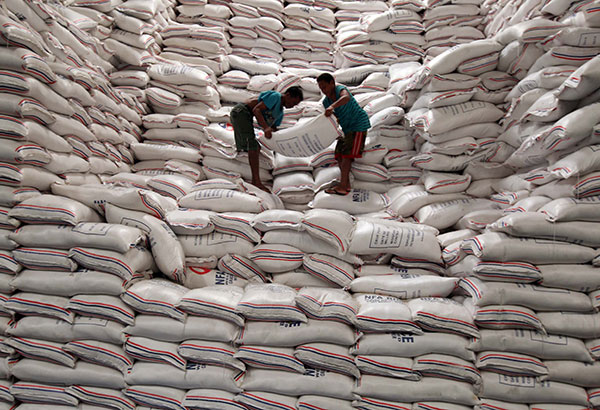Philippines: Government to proceed with rice importation after all
MANILA, Philippines — After several deferments, the government is now pushing through with rice importation through a government to private sector (G2P) scheme for buffer stocks in preparation for the coming of the lean months.
While the volume to be imported is yet to be determined, the interagency National Food Authority Council has approved the importation and is shifting to G2P from the earlier planned government-to-government scheme.
State-run NFA has been pushing for the importation of 250,000 metric tons (MT) of rice since January but the multi-agency council deferred the proposal several times following the bumper harvest of local farmers this summer.
NFA also has an existing debt of P152 billion as of end-April, a big factor in why the agency’s proposal to import has been rejected a couple of times.
NFA said it is still unsure whether the government will consider the 250,000 MT standby authority as the council awaits the recommendation of the National Food Security Committee later this week.
‘More competitive, least corrupt’
Meanwhile, NFA Council chairman and Cabinet Secretary Leoncio Evasco said the new scheme will be more more competitive, least corrupt and transparent.
“We have to make drastic changes in order to ensure a corrupt-free and competitive bidding process at the NFA. Instead of doing a G2G, the council will push for a G2P to increase accountability and transparency. While the G2G is exempt from the Government Procurement Reform Act, G2P is not,” Evasco added.
Instead of limiting the bidders to government counterparts, private suppliers from participating countries may now be allowed to participate in the bidding, making the whole process covered by the Government Procurement Reform Act, unlike the current G2G scheme.
To recall, the Department of Agriculture also suggested the immediate importation as the harvest season ends and world market prices plummet.
Agriculture Secretary Emmanuel Piñol maintained that NFA should start the process now as it would take approximately two months before the arrival of the rice, which will be just in time for the start of lean months in July.
The NFA is mandated to maintain a food security reserve good for at least 15 days at any given time.
By July 1, which marks the onset of the lean season for rice, the NFA must have at least a 30-day buffer stock to meet the requirements of victims of calamities and emergencies.
President Rodrigo Duterte fired an undersecretary with the Office of the Cabinet Secretary in April for pushing for rice importation.
“Why would we allow importation to compete with local product?’ Hanggang ngayon, hindi ko mabasa anong ginawa nilang rason (Until now, I cannot figure out their reason for doing that). Of course, hindi natuloy dahil binara ko (it did not push through because I stopped it),” the president said then.
Lean months coming
The lean months, which starts July and ends September, is a period of low or zero harvest, thus buffer stock requirement is doubled to ensure that the government will have enough supply should the country face calamities and other emergencies.
Latest data showed that the country’s rice inventory declined by 20 percent to 2.7 million (MT) as of April. The NFA itself has depositories enough for 10 days only.
The council also approved the importation of 805,000 MT of rice this year via the minimum access volume (MAV) scheme.
The MAV refers to the volume of a specific agricultural product that is allowed to import with a lower tariff as a commitment of the Philippines under the provisions of the General Agreement on Tariffs and Trade of the World Trade Organization.
The annual MAV importation is being shouldered by the private sector.
The council has directed NFA to amend the MAV guidelines to require participating traders to import 25 percent brokens from their 25 to 30 percent quota to ensure adequate supply and stable prices at levels within the reach of low-income families.
“This way, we are assured that cheap rice will be made available in the local market. This policy shift is more consistent with the president’s pro-poor policy,” Evasco said.
The NFA Council is composed of Evasco and representatives of the NFA, Bangko Sentral ng Pilipinas, Development Bank of the Philippines, Land Bank of the Philippines, Department of Finance, Department of Trade and Industry and National Economic and Development Authority.
Source: http://www.philstar.com/business/2017/05/16/1700553/government-proceed-rice-importation-after-all


 English
English




